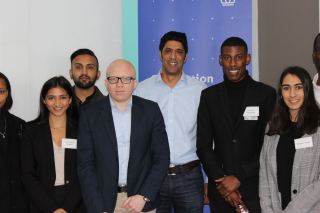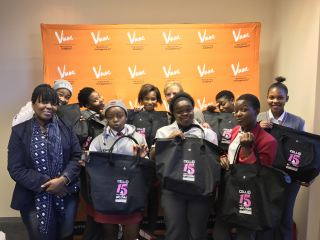Giving every SME a chance to strive through innovative finance will create much needed jobs
There is consensus that South Africa needs to create millions of job opportunities, and these are needed now more than ever as the country’s unemployment continues to rise unabated because of the corona pandemic. Stats SA’s latest Quarterly Labour Force Survey (QFLS) for the first quarter of 2021, shows the number of unemployed people in the country at an all-time high of 32.6%. There is a second, and generally accepted, consensus that most of these jobs will come from micro, small and medium enterprises. The first iteration of the National Development Plan (NDP) proposed that for South Africa to overcome poverty and reduce the proportion of people who are dependent on state’s welfare, the SME sector would have to grow significantly. In 2015, the government had set ambitious unemployment reduction targets aiming for 14% by 2020 and 6% by 2030, and this was to be achieved by creating about 11 million new jobs through the SME sector.
These were bold ambitions by the NDP crafters and government received it with open arms because it would go a long way in reducing the current dependency on social welfare and hopefully add to the fiscus through taxes. However, reality today is that the official unemployment figure is 32% and the economy is in worse position due to corruption in key institutions and the corona pandemic in the last 13 months.
Our SME sector is also hindered by another hurdle in the form of limited funding options. South Africa has well developed and sophisticated financial institutions capable of funding most well packaged projects. The 2019 IFC-World Bank Report* on Micro Small and Medium Enterprises (MSME) shows that most SMEs fail to grow due to red tape, uncoordinated support for small businesses and risk averse type of funding by banking institutions. Unfortunately, if this attitude does not change drastically, and with immediate effect, we will not see the millions of jobs the SME sector has potential to create in the short term.
Fortunately, the corona pandemic has also exposed the need for a change in attitude on how we take SME funding decisions. The fact that only a small fraction of the government’s R200-billion meant to support businesses during the pandemic has been disbursed is a serious indictment on how traditional funding decisions need to evolve with the times. The government fund has suffered immensely because these funds are administrated by financial institutions which have been accused of applying their normal funding criteria even during a crisis, leading to thousands of SMEs folding under the pressure of prolonged economic inactivity.
If South Africa is to move a gear or two up in fighting unemployment, there needs to be a serious rethink on SME funding. Khulisa Investment Partners has found that wearing an entrepreneur’s hat when assessing an investment works better to see the potential of a start-up or a business at its formative stage. The company has managed to fund and offer support to some inspiring SMEs in the past year, these are business that falls within the “missing middle” category as they are either too small or big in the traditional sense of assessing funding criteria. The current trajectory of using traditional credit assessment when looking at an investment or funding for SMEs will idle the country for the next decade, whilst more jobs will be shed and, opportunities missed.
According to the IFC the total MSME finance gap between supply and demand in South Africa is about $30 billion. Total funding provided to this sector is currently $16 billion or about R230 billion. At the moment, commercial banks provide the majority of the financing extended to formal MSMEs, representing 68.9 percent or about R160-billion. There is also a huge chunk of funding which comes through Government and microfinance institutions, mostly focusing on the informal sector.
The IFC also notes that the potential for the MSME sector to drive economic growth and employment could be better utilised if MSMEs were able to access productive financing. MSMEs face serious challenges gaining access to finance, especially from banks. One estimate suggests that 75% of MSME credit applications are rejected, while only 2 percent of new MSMEs are able to access bank loans. Constrained access to finance is especially acute at the lower end of the MSME market where a “missing middle” – those firms too big for micro-finance but too small for traditional institutional financing – leads to MSMEs being under-served. This is due to a combination of factors affecting the supply of finance by bank and non-bank financial institutions, such as regulation, as well as MSME specific characteristics, such as a lack of basic business or financial skills.
South Africa is struggling with high unemployment levels, especially among young people aged 15 to 34 years. The Stats SA’s Quarterly Labour Force Survey shows the unemployment rate within this age group was 43.3% in the first quarter of 2020. To deal with this ticking timebomb, we need on new lenses on how the country funds SMEs, and a significant part of the solution could be a increasing the role of private equity players, in the same vein as the Section 12J.
SMEs make up 98% of all companies in South Africa and continue to prove that they are the lifeblood of the economy. While SMEs can play a critical role in creating jobs – they also perform other important functions such as supporting innovation and helping drive diversification and economic transformation.
For South Africa to take advantage of the potential of the SME sector, there is a need to remove the burdensome credit and collateral requirements of commercial banks and traditional financing institutions. We need to find alternative ways of securing funding and while encouraging an entrepreneurial spirit. This will enable us to capture more of the “missing middle” businesses, and in turn help resurrect this floundering economy as we emerge from the ruins of covid.
If South Africa is to have a fighting chance against unemployment, we should look at the alternative funding space of venture capital and private equity institutions. We should use every available opportunity to fund inherently good businesses that have been overlooked purely because of their size or other traditional criteria. At Khulisa Investment Partners, we have found and partnered with some amazing SMEs, and that is possible because the spectacles used to identify and invest in these businesses are those of entrepreneurs and not the traditional risk averse institutions. It is in these SMEs that we will turn the tide against unemployment and build an inclusive economy that gives young South Africans the opportunity to be creators of jobs instead of being job seekers.
-- END --
Dr Phumla Mnganga is the Chairperson of Khulisa Investment Partners. Khulisa is an innovative Black-owned management company providing investors with a diversified portfolio of investments. It was established in 2020 and currently have 3 funds which are centred on achieving the United Nations Sustainable Development Goals (SDG).
Coronation CEO invites young people to have their say this Youth Month
To mark Youth Month and recognise the importance of tapping into the powerful insights of South Africa’s youth, Coronation Fund Managers invited 35 finance and business university students to its Cape Town offices for an interactive discussion session with CEO Anton Pillay.
Students from the University of the Western Cape and the University of Cape Town met with Anton and other Coronation team members under the theme #HaveYourSay. During the session, students discussed their experiences and aspirations as a young person studying towards a career in finance and business in South Africa and shared their views on what motivates them, how they see themselves contributing to society and what purpose and values drives their ambitions.
“We are committed to travelling alongside young people in their mission to change the world for the better. They are the future contributors to society and leaders of the country, and their voices are critically important to discussions about how we, as an industry, can support young people as they work towards their future and career. “And I know that it’s not easy for young people today.
The burden of unemployment is still concentrated among the youth, with those aged between 15 and 34 years accounting for 63.4% of the total number of unemployed persons in South Africa. This has to change, and we will continue to be a part of driving this change through our long-term, youth-focused programmes,” says Anton.
Addressing a 2019 Youth Day celebration on 16 June, President Cyril Ramaphosa called on the private sector to create pathways into work for young people who are prepared to learn, work hard and better themselves. Coronation is doing just that through our continued investment in long-term youth initiatives that support education and provide meaningful opportunities for the youth from cradle to career.
Several of the students in attendance at the Youth Month event were part of the Young Investor Programme (YIP) programme at the University of the Western Cape, while others were recipients of Coronation’s Bursary Programme.
The YIP programme aims to bridge the gap between the theoretical knowledge obtained at university and practical work requirements, preparing budding asset managers for the challenges and rewards of the finance and investment industry. In addition to our early childhood initiatives, the Coronation Bursary Programme and the South African Innovation Learning Intervention (SAILI) high school scholarship programme has given 223 university students and high school learners from underprivileged communities across South Africa the chance to achieve their dreams of a better future.
To ensure they are able to bridge the gap between their studies and the world of work, vacation roles and internships are also made available. In addition to education funding, they also receive mentoring and access to support services. Coronation is also a participant in the Youth Employment Services, or YES, initiative, which is a partnership between government, business, labour and civil society that aims to create employment for one million young South Africans over the course of the next three years.
Since its launch in March 2018, the initiative has placed over 18 000 young people in employment opportunities and is providing business infrastructure and support through its community hubs. “We truly believe in the power of our youth and the contribution that they can make to the financial services industry and our organisation. If they are given the right amount of support, they can go on to make real change and have a positive impact on society and our country” says Anton.
Job Search e-learning empowers South Africa’s unemployed
Job Search e-learning empowers South Africa’s unemployed. We all know that unemployment is one of the greatest problems faced by South Africans, this has been the case for some time and will remain so until concrete, wide reaching and actionable interventions are developed and set in motion.
With an overall unemployment rate of around 27% and a youth unemployment rate hovering around 50% these interventions are needed urgently and in all spheres of the economy. From the creation of new job opportunities to empowering job seekers to be able to actively and successfully secure appropriate jobs. Angelo Pereira Managing Director of GOAL2WORK Jobseekers Toolkit said; “There are many programmes and interventions directed at attempting to reduce the unprecedented unemployment rate in South Africa.
However with the large scale of our unemployment crisis, reaching all of those affected personally becomes logistically almost impossible.” “We have found that whilst we were touching over a thousand individuals annually via our face to face workshops; which are designed to provide a clearly defined course of action aimed at viable positioning in the market in the shortest possible time, this was only a drop in the very large ocean of those needing to learn the essential skill of searching for and securing meaningful employment.”
When considering various options for expanding the reach of the GOAL2WORK programme it soon became apparent that e-learning was the most viable route to follow.
“Most of our target audience, even those in remote areas and with limited financial resources, had access to at least one device with which they could access the internet, mainly via their cell phones.” said Pereira.
With this in mind GOAL2WORK set about developing an e-learning version of their powerful lecture led workshops which teaches the abilities required to develop and implement a successful job search plan whilst reinforcing self-esteem and addressing many other obstacles a jobseeker may face. “It took us over a year to develop a programme which would provide all of the required content in an engaging, fun and interactive way.
The programme is fully animated with voice over, gamification, and interactive exercises.” On the technical front the programme was developed in modules which download as they play and are small enough not to require extensive data. Should users choose they can complete the programme using data on their phones or view small snippets “on the go” and then cover more of the programme when Wi-Fi is available or on home pc’s and tablets.
The GOAL2WORK e-learning programme is now completed and the company is exceptionally excited to make it available to as many unemployed South Africans as possible. Pereira added, ”we have already made the programme available for individuals to purchase via our website, however we are now actively looking for corporate, government and educational institution partnerships to spread the programme as widely as possible to those unemployed South Africans who so desperately need assistance.”
Contact: Angelo at 011 949-9000, This email address is being protected from spambots. You need JavaScript enabled to view it., www.goal2work.co.za for further information.
First Interview Launches A Free Video Portal For Job Seekers And Employers
A Groundbreaking Concept to Facilitate Employment For Candidates And Companies Via Video
Durban, KwaZulu Natal: Today, First Interview launched a brand-new portal aimed at putting job seekers in front of employers - without actually putting them in front of each other! Job hunters simply upload a two-minute video introducing themselves to prospective employers – who can then view the video at their leisure. This short-cuts the entire recruitment process by cutting out time-consuming CV-sifting and initial screening.
If employers like what they see and hear on the video, they can contact the job hunter via the portal, requesting their CV and personal details. Candidates have no idea who has viewed their profiles, and have no access to employer contact details, making the entire process confidential and secure. First Interview founder, Angelique Laaks, says, “Our portal is free for both job seekers and employers. It’s simple and easy to use, and it’s local. Most importantly, however, it allows employers to ‘meet’ the job seekers in two minutes - without having to scan through CVs, set interview times, schedule time with HR, and so on. It’s also easier for job seekers, as they don’t have to take time off work, or arrange transport to and from screening interviews.”
The whole idea behind First Interview is that it helps prospective employers get a feel for who a candidate actually is – something that’s hard to gauge from a personality-free, one-dimensional CV. The portal is highly beneficial for all job seekers, but particularly for new graduates, and those looking for front-line positions in the customer service, hospitality and retail sectors. These are candidates who are hired for who they are - their personality and how they present themselves – and is more important than a list of qualifications on a CV.
About First Interview
First Interview is a free portal that provides the missing link in the recruitment process by changing the selection procedure and allowing employers to meet candidates first via a short, pre-recorded introductory video. It makes the recruitment process faster, easier and cheaper for both parties, and gives employers and candidates a better chance of finding each other. First Interview is not a recruitment company, so it doesn’t charge fees or commissions. Nor does it guarantee placements. For more, visit www.firstinterview.co.za
Vuma Reputation Management Celebrates 15 years of Cell C Take a Girl Child to Work Day®
Johannesburg, South Africa, 30 May 2017. Vuma Reputation Management is proud to have hosted eight learners from the Kwabhekilanga Secondary School, during the 15th annual Cell C Take a Girl Child to Work Day® on May 25th, 2017. Vuma Reputation Management spent the day with the learners under the mentorship of the executive team. A detailed programme was planned that involved what the company is about, what it does, what the respective roles of the various employees are; how the company operates on a daily basis and specifically on what reputation management is all about.
Education is a vital component to fostering sustainable gender equality and empowerment of women. Cell C’s Take a Girl Child to Work Day ® statistics show that this day has a profound effect on a girl child with many choosing a career based on their day in the workplace. Janine Hills, founder and CEO of Vuma Reputation Management says: “We are delighted to have taken part in this life altering initiative for young women and have made a commitment to assist the school in providing reading material for the learners”.
Issued by:
Tshego Kekana
Account Manager
Vuma Reputation Management
087 941 3497
This email address is being protected from spambots. You need JavaScript enabled to view it.
15 FACTS ABOUT THE CELL C TAKE A GIRL CHILD TO WORK DAY®
1. Take a Girl Child To Work Day® was started in 2003 as Cell C’s flagship CSI project. The programme targets Grade 10 to 12 girl learners, who want to start making decisions about their future careers. In the last 15 years, this impactful campaign has grown into a nationwide movement and one of South Africa’s most recognisable and successful social campaigns.
2. From the very beginning, the project aimed to expose girls to a day in the professional workplace, showcasing a wide variety of career opportunities they would not otherwise be exposed to – and in doing so helping them to dream, believe and achieve.
3. The Cell C Take a Girl Child to Work Day® initiative contributes towards the development of strong, smart, bold girls and assist in preparing a core of future women leaders who will be vibrant contributors to the economy and leading job creators for our country.
4. The concept caught the imagination of corporate South Africa and its growth has been exponential. In 2003, 85 companies signed up to host school girls. By 2016, a record 720 corporates partnered with Cell C to host an estimated 100 000 girls.
5. To date, more than 750 000 girls have been through the programme.
6. The campaign has been received with enthusiasm and excitement from all sectors: government, the corporate world, media and the non-profit sector. Some of the high-profile people who have supported the project since its inception include former President Nelson Mandela; former President Thabo Mbeki; current President, Jacob Zuma; former Deputy President, Phumzile Mlambo-Nqcuka; Minister of Women in the Presidency, Ms Susan Shabangu; erstwhile Public Protector, Thuli Madonsela and JSE CEO, Nicky Newton-King – to name just a few.
7. Well known South African women (among them Basetsana Kumalo, Rolene Strauss, Cheryl Carolus, Sophie Ndaba, Leanne Manas, Jenna Clifford and Dolly Mokgatle) have served as ambassadors for the campaign. As successful women in the fields of media, business, government and politics, these women provide an example to young women while helping them believe that anything is possible.
8. Seeing the need for an initiative that helps young women further their education, and wanting to replace the “one day” concept with a legacy programme, Cell C partnered with the Tomorrow Trust in 2012 to form the Cell C Girl Child Bursary Fund. To date, 30 girl learners from disadvantaged backgrounds have received bursaries to pursue Further Education and Training (FET).
9. Cell C also established a Girl Child Institute of Mentorship in which successful senior female executives and managers share their expertise and time with girl learners.
10. At a United Nations World Conference on Women in 1995, the development of the Girl Child was identified as one of twelve thematic areas of need.
11. In 2015, the African Union, acknowledged that a lot still needs to be done in Africa to bring women into the epicentre of development. They have declared 2010 - 2020 the ‘African Women’s Decade’ under the theme: “Grassroots approach to gender equality and women’s empowerment”. The Africa Agenda 2063 provides for 50% women representation in decision-making by 2020.
12. The vision of Africa 2063 is a Continent with full gender parity, with women occupying the centre stage in all sectors relevant to the economy. The successful implementation of this strategic framework will go a long way in destroying the economic and political glass ceiling that restricts women’s progress and integration into the economic mainstream.
13. The Cell C Take a Girl Child to Work Day® initiative was recognised in October 2016 as one of the unique interventions that seeks to address not only an ICT industry skills risk, but also a national risk of girls failing to take up the opportunities open to them in the corporate world which has an obvious effect on aggravating the skills shortage. The award was given to Cell C in recognition of its contribution towards managing the Skills Shortage risk and addressing inequality. According to the Institute of Risk Management of South Africa (IRMSA), skills shortage is the third highest risk both on national and industry levels.
14. One of Cell C’s proudest moments was when the project was voted as one of the country’s “single largest collaborative acts of volunteerism” by The Encyclopaedia of Brands and Branding in South Africa.
15.In keeping with the theme of empowering women, the majority of Cell C’s workforce is female.
Social media stalking in the job hunt
In the world we live in today, we are all concerned with safety. We have constant worry that we are being watched, that our every moved is being documented with a constant fear of danger around every corner. I have news for everyone................
we are all being stalked, and there is nothing you can do to stop this. Everyday we are judged, assessed, scrutinized. With the ever increasing use of social media in our lives, being watched is something that we can not stop. With most people being active on one or more social media platforms, we open up our lives to everyone and any one across the globe. Social media has turned the world in to a much smaller and more accessible place.People will be view your activity regularly, as we invite the world into our lives by participating on social media.
BUT..................... you are being judged. Weather you approve or not, like it or not, or if you are aware of it not, every time you apply for a job, a recruiter, HR manager or hiring manager is scrutinizing your social media activity. They will be randomly looking for reasons that a giant red flags for a reason not to hire you. Now that is a reality shock for most. But this does not have to be the career suicide that you may think.FAROSIAN conducts balanced, unbiased and impartial social media assessments for recruiters, businesses as well as individuals (for those who are brave enough to see what their social media accounts are saying about them). We have perfected a sound process to ensure that there will never be any possibility of discrimination, that all personal values, morals and ethics are taken out of the equation, and provide consultative sound recommendations, for all (including advice for individuals how to improve their image on social media)Recruiters, businesses, HR managers and individuals should contact us on
This email address is being protected from spambots. You need JavaScript enabled to view it. for more information on getting your social media report.






